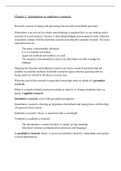Chapter 1: Introduction to qualitative research
Research consists of asking and answering relevant and researchable questions.
When there is an activity for which some thinking is required first, we are dealing with a
research of social sciences. Science is only acknowledged and accepted as such, when the
researchers comply with the rules that concern executing the scientific research. The most
important rules are:
- The study is theoretically informed
- It is a systematic procedure
- Approved methods and technics are used
- The research is documented in such a way that others are able to judge the
findings.
Studying the literature and talking to experts can lead to research questions that are
suitable to scientific methods. Scientific research requires that the questions that are
being asked are related to the theory in some way.
When the goal of the research is especially knowledge, then we speak of a grounded
research.
When it is mostly aimed at using knowledge to improve or change situations, then we
speak of applied research.
Qualitative research can be both grounded and applied.
Quantitative research= drawing up hypotheses beforehand and testing these with the help
of empirical observations.
Qualitative research= theory is used more like a searchlight.
Variations in qualitative research:
- The interpretative variation (reality is central, giving meaning)
- Structural variation (communication processes and language)
In qualitative research, theory is seen as an attempt to describe, understand, and explain
a social phenomenon.
,In quantitative research, a deductive process is used; the theory is the starting point for
the formulation of the hypothesis that is being tested in the research.
In qualitative research, inductive thinking is used; a research of a social phenomenon is
carried out by the request of finding empirical pattern that can function as the start of a
theory.
Paradigm= a frame for thinking about the outline of a research, the measurement, the
analysis, and the personal commitment by the members of field of speciality. They reflect
the questions that concern the nature of social reality and the nature of knowledge.
Ontology= nature of the social reality.
Epistemology= concerns the question whether there is one road to truth, or that one
needs several methods to describe the meaning of social experience.
Constructivism= Qualitative research usually starts with the assumptions that
individuals have an active role within the construction of social reality and this demands
that the research methods can take the place of this process of social construction.
Grounded theory= glaser & strauss, want to breath new life into empirical research with
this research strategy. They though that etnograpghic research tried too much to describe
instead of explaining social phenomena. They contributed to the systematical approach of
qualitative research in general and to the qualitative analysis.
They offered a methodology in which the data are the middle point to reach a theoretical
description of a phenomenon and to explain it. The data are systematically generated and
are analyzed step-by-step to develop the theory. The start of the research has mostly an
explorative character. Comparable cases need to be found to expand, confirm or to
deepen the statements. This is called a theoretical sample, because the choice of new
cases depends on the theoretical needs of the researcher.
The data are analyzed with the help of a technique called “coding”, in which the relevant
parts of the data are indicated and labelled. Through a constant comparison of the newly
collected data with earlier results, the process slowly progresse from the coded parts of
the data to conceptual modelling and theory-forming.
The aim of qualitative research is to describe and understand social phenomena in
terms of the meaning that people add to them.
The research questions are studied with the help of flexible methods, making contact with
those involved necessary to understand what is happening in the field.
, The methods produce rich, descriptive data that have to be interpreted with the
identification and coding themes and categories and which can lead to findings that can
contribute to theoretical knowledge and practical use.
Biggest area of concern for qualitative researchers is “what all of it means for the people
who are involved”.
People talk about their social reality, they give their opinion on what they think is
happening, they share their experiences, they show what they feel.
In case of an inductive approach, it is often not clear beforehand which data will be
generated and what the framework of the analysis will look like. Improvisation, creativity
and flexibility need to be allowed in the phase of analysis.
Qualitative researchers have tools like describing what they heard and presenting notes
from field work.
The researchers cannot jost present “raw data”. They are obligated to give a re-
interpretation of the data that still represents the meaning maintained by the participant.
The researchers do not only have the goals of describing what is happening, but they also
want to explain how it works and why things are happening in that way.
Chapter 2: Research Design
The research plan:
- Research questions
- Research goals
- Ethical section
- The spread of the results
- A strategic plan with the methods.
Literature review= acknowledging the already existing scientific knowledge, including
possible theories.
Theories= coherent frameworks that describe and explain aspects of the social life.
Research questions can be adjusted during the research.
Literature research= important to determine the topic of research, points out the gaps in
existing knowledge, clarifies the scientific contribution of your research.





